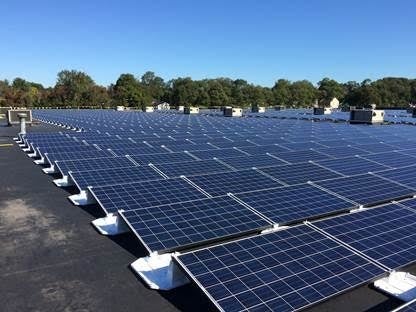With the state eyeing a future of net-zero carbon emissions by 2050, the Baker administration’s top energy official said Monday the new Biden administration offers hope for a better partner at the federal level, but said challenges remain.
Energy and Environmental Affairs Secretary Kathleen Theoharides told a conference of regional power generators, market regulators and other energy experts that offshore wind remains the linchpin of the state’s clean energy transition, but said it will need other help to meet its goals.
“To fully address the issues of climate change, we feel strongly we need every level of government working in this space and I am hopeful there will be increasingly emphasis on this in the new administration, but I have no doubts that it will continue to be a challenge given the politically divisive nature of climate action,” Theoharides said.
Federal Energy Regulatory Commissioner Neil Chatterjee also predicted that the new Biden administration would bring renewed focus on climate and energy policy, and predicted that FERC would become the “epicenter” of those policy debates.
“It’s clear that energy and environmental policy issues are going to be top priorities for the incoming administration,” said Chatterjee, a Republican who was recently demoted by President Donald Trump from chairman of FERC.
With a divided Congress making something like a national carbon pricing an almost impossible political lift, Theoharides said the federal government could make an impact by setting national minimum standards, such as fuel standards.
She pointed out the recent decision by General Motors to withdraw from Trump’s challenges to California’s fuel efficiency standards and support the minimum requirement that is followed by 40 percent of the U.S. Market, including Massachusetts.
“The importance of these fuel efficiency standards cannot be overstated to a decarbonized future,” Theoharides said.
The discussion was part of the third day of the virtual 2020 New England Energy Summit, hosted by the New England Power Generators Association and The Dupont Group. In addition to Theoharides and Chatterjee, the panel included ISO-New England President Gordon van Welie and was moderated by former FERC chairman Joseph Kelliher.
The next month promises a lot on the energy front for Massachusetts, with the Executive Office of Energy and Environmental Affairs preparing to publish its “roadmap” to achieve net-zero carbon emissions by 2050 before the end of the year.
The coalition of New England and mid-Atlantic states putting together a cap-and-trade program for vehicle emissions also plans to release the final framework of the program for states to sign on to in December.
Theoharides said the administration’s analysis has shown that offshore wind is “the way to go,” with energy efficiency, broad-scale electrification and carbon sequestration all pieces of the puzzle. The secretary said if permitting delays or other roadblocks prevent offshore wind from being scaled up then the construction of new nuclear facilities might be needed to meet the net-zero goal.
While Massachusetts has pursued regional strategies to reduce emissions from the power generation sector and now the transportation sector, Theoharides said she would favor “more holistic” approaches in the future, including a federal clean energy policy.
All of the panelists acknowledged that tension has long historically existed between the states, the federal government and the grid operators. Van Welie said that tension will persist as states look to expand their renewable energy portfolios, crowding out more traditional fuel sources.
Van Welie shared with the group ISO-New England’s new “vision statement” : “To harness the power of competition and advance technologies to reliably plan and operate the grid as the region transitions to clean energy.”
The statement, van Welie, said, endorses the use of wholesale markets to drive efficiencies and signals a “leaning into the broad policy” of decarbonization.
Van Welie, however, said it will remain important to “maintain a robust fleet of balance resources” to augment renewable sources during times when they are not enough to meet demand.
“This is the nexus of the tension that exists,” van Welie said.
Chatterjee was replaced as chairman of FERC by Trump in September, and the commissioner speculated that his demotion may have had something to do with the positions he took related to carbon pricing.
Chatterjee said he supports market-driven solutions to the country’s energy challenges, not subsidies that favor one resource over another. However, he led FERC this fall to issue a draft policy statement signaling its openness to grid operators like ISO New England integrating carbon pricing into its wholesale markets.
He said he believes carbon pricing as a fuel-neutral strategy to transition to renewable energy could be “harmonized with the markets we oversee,” and he said southwestern and western states were looking to the Northeast to see how market reforms might work here.

